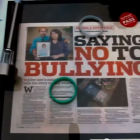
Social Media: The New School-to-Prison Pipeline for Black Youth
|
The school-to-prison pipeline is gaining fuel based on inappropriate behavior on social media. The pipeline is the trend of funneling students from public schools...
Juvenile Justice Information Exchange (https://jjie.org/tag/cyberbullying/)

The school-to-prison pipeline is gaining fuel based on inappropriate behavior on social media. The pipeline is the trend of funneling students from public schools...

“Bully,” a documentary movie that follows five kids who are brutalized by classmates over the course of the year, is set to hit theatres by the end of the month, but not as many teens may be seeing the movie as the producers had hoped. When the Motion Picture Association of America (MPAA) stamped the movie with an “R” rating back in February, a number of people raised concerns that it may not reach many in the demographic the film aimed to impact -- those under 17 and still dealing with aspects of bullying in their daily lives. What do you think of when you hear about bullying? Hitting, slapping, harassment, name-calling and profanity are but a few of the adjectives that come to mind. All are present in the movie -- and why wouldn’t they be?

LISTEN:
‘It Was Just Pretty Much Assault Every Day’: Alleged School Bullying Victim, Mom Speak Out On Georgia’s New Bullying Law. Back to school season is in full swing and like so many other families around the country 13-year-old Alicyn and her mother Annise Mabry are busy keeping up with the demands of the school year. https://jjie.org/alleged-school-bullying-victim-mom-speak-out-on-georgias-bullying-law/40307/2
However, instead of preparing to go to a local school, Ali takes classes at home. Instead of a classroom, she logs onto her laptop for online lessons. Instead of a teacher, her mom is her instructor.

I’ve been a journalist a lot longer than I’d care to admit (a lot of people mistake me for younger), so admittedly after a while the articles I write sometimes begin to blur together. However, one thing’s for sure: the name Jaheem Herrera will forever remain etched in my mind. I remember clearly the first news reports of this metro Atlanta boy’s suicide in 2009. The images of his mother, heartbroken and sobbing splashed across my television screen aren’t easy to erase. I was honored to be among the first people Masika Bermudez agreed to speak to after her son’s untimely death.

Young people are more likely to use slurs online, and most see discriminatory language as joking, according to an Associated Press-MTV poll of 14- to 24-year-olds conducted nationwide in 2011. Seventy-one percent say they are more likely to use slurs online or in text messages than in person. Also, most young people don’t worry about whether the words they post on their cellphones and laptops could reach a wider audience or get them in trouble, according to the ABC Action News article. "People have that false sense of security that they can say whatever they want online," Lori Pletka, 22, told the reporters. Although most people see slurs as joking — 57 percent say people are "trying to be funny" — a significant number of youth are getting upset, especially when they are in the group being targeted.

Bullying has forever been a fact of life for school kids, but the advent of social media and the Internet has extended the reach of bullies into the victim’s homes. Attorney Andre Agatston of Marietta, Ga., wants to raise awareness of cyberbullying and give parents and kids the tools to stop the harassment. Agatston is a former member of the Executive Board of the Children’s Advocacy Centers of Georgia and currently serves on their Advisory Board. His practice has a special focus on children’s advocacy issues and victim’s rights.

Georgia students may want to think twice about bullying someone online, especially if HB 310 passes. HB 310, better known as “The End to Cyberbullying Act,” will take the current law and expand it to include any form of cyber communication that would be considered bullying. Currently, the law in Georgia prohibits any form of bullying of another student only on school property, busses, bus stops and at school events. If the new provision were to become law, school officials could act even if the cyberbullying didn’t occur on school property. For example, if a student decides to send a threatening message through Facebook while at home to another student, the student who sent the harassing message can still be disciplined by school officials.
Two Florida high school girls were busted for cyberbullying after creating a degrading phony Facebook page for a fellow classmate. Police say Taylor Wynn, 16, and McKenzie Barker, 15, posted graphic, lewd messages on the page and photos with their schoolmate’s head pasted on the body of a naked, prepubescent girl. Wynn told police they created the page as a joke because,“Nobody liked her.” The page, created in April, had 181 friends. A classmate of the victim alerted school authorities to the page, which was quickly taken down. Police say the two girls created a new page attacking the victim soon after that was also taken down. The victim has reported that because of the Facebook page she has been subjected to “numerous incidents of teasing and ridicule.”
Unfortunately, cyberbullying is nothing new but, as JJIE.org reported in November, Facebook has created an application that reports incidents of bullying. In December we told you about a girl who tracked down two college students who were harassing her online.

When Ally Pfeiffer saw a Facebook page under her own name that made hateful and harassing comments about her weight and appearance, she cried. But not for long. The 18-year old college student decided to find out who was impersonating her online and who set up the phony Facebook account using a cow in place of her picture. Ally tells WFSB-TV how she tracked the IP address and discovered two of her high school friends were behind the brutal prank. She turned the information over to police in Bristol, CT. They arrested two University of Connecticut students, Jeffrey Martone and Sarah Johnson who now face criminal charges. The Bristol Press reports on the simple steps Ally took to solve the crime. The suspects used a fake Gmail account created in her name. She clicked on “Forgot Password,” guessed the answer to the security questions, opened the email and Facebook accounts, and changed the passwords. Then she used a free IP address tracker. Ally talked about her ordeal on the Today Show.
A new “Find Help” application on Facebook may make it easier for teens to not only report cyberbullying but also to find support organizations. Mashable.com reports that a company called SafetyWeb.com,has introduced the new app to address growing concerns about teen safety on the social networking site. According to CBC news, the “Find Help” application is similar to an online list of emergency phone numbers. When a child clicks on the application, he or she is directed to phone numbers and links for reporting incidents. This also sends kids to organizations like the National Center for Missing & Exploited Children’s CyberTipline, the National Suicide Prevention Hotline and Facebook’s abuse reporting process. Since 2003 there have been at least 12 teenagers who commited suicide because they had been bullied online.